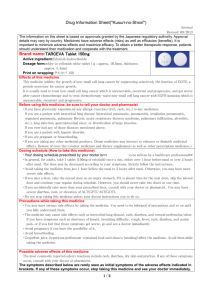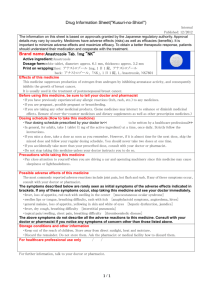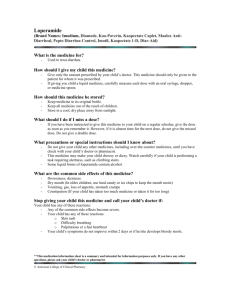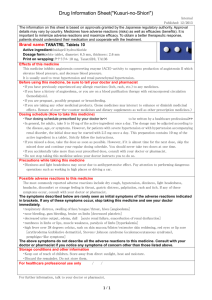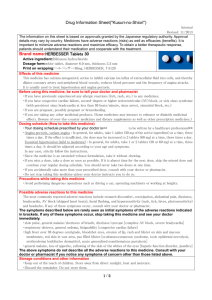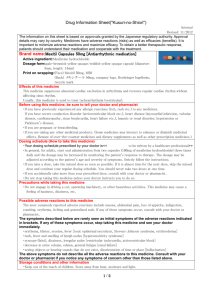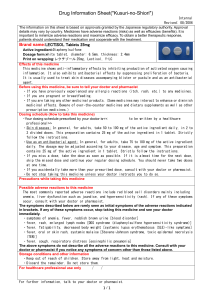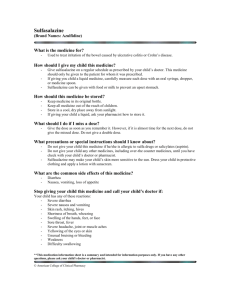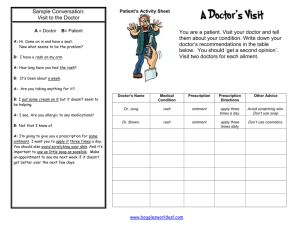Drug Information Sheet("Kusuri-no-Shiori") Internal Revised: 09
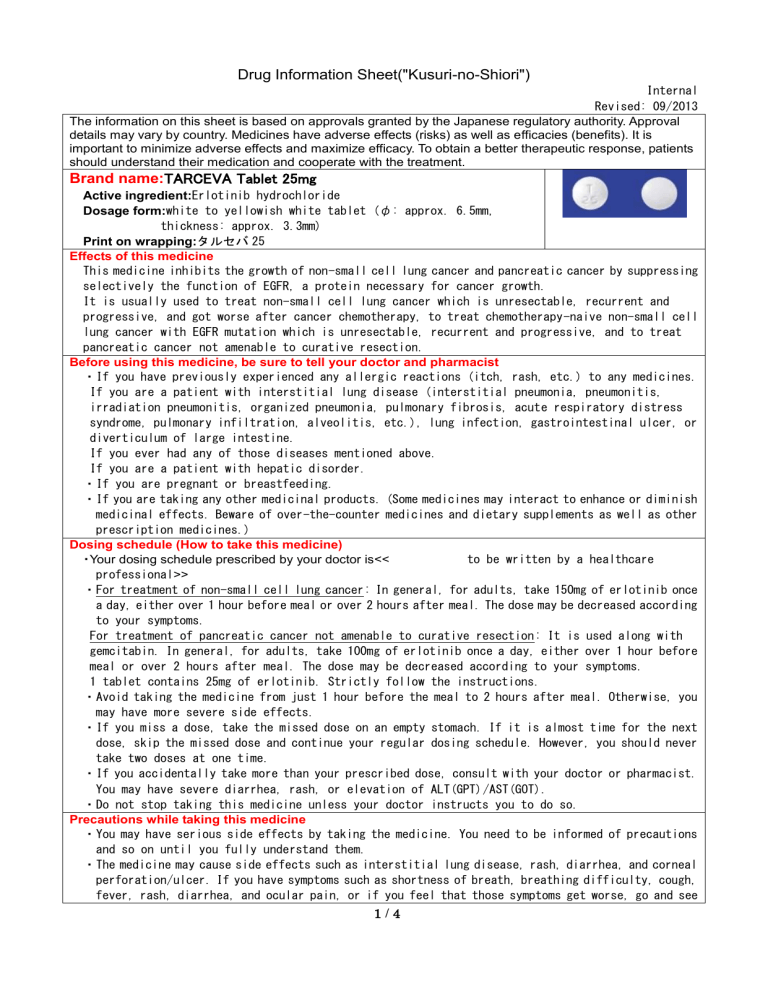
Drug Information Sheet("Kusuri-no-Shiori")
Internal
Revised: 09/2013
The information on this sheet is based on approvals granted by the Japanese regulatory authority. Approval details may vary by country. Medicines have adverse effects (risks) as well as efficacies (benefits). It is important to minimize adverse effects and maximize efficacy. To obtain a better therapeutic response, patients should understand their medication and cooperate with the treatment.
Brand name: TARCEVA Tablet 25mg
Active ingredient: Erlotinib hydrochloride
Dosage form: white to yellowish white tablet (φ: approx. 6.5mm, thickness: approx. 3.3mm)
Print on wrapping: タルセバ 25
Effects of this medicine
This medicine inhibits the growth of non-small cell lung cancer and pancreatic cancer by suppressing selectively the function of EGFR, a protein necessary for cancer growth.
It is usually used to treat non-small cell lung cancer which is unresectable, recurrent and progressive, and got worse after cancer chemotherapy, to treat chemotherapy-naive non-small cell lung cancer with EGFR mutation which is unresectable, recurrent and progressive, and to treat pancreatic cancer not amenable to curative resection.
Before using this medicine, be sure to tell your doctor and pharmacist
・If you have previously experienced any allergic reactions (itch, rash, etc.) to any medicines.
If you are a patient with interstitial lung disease (interstitial pneumonia, pneumonitis, irradiation pneumonitis, organized pneumonia, pulmonary fibrosis, acute respiratory distress syndrome, pulmonary infiltration, alveolitis, etc.), lung infection, gastrointestinal ulcer, or diverticulum of large intestine.
If you ever had any of those diseases mentioned above.
If you are a patient with hepatic disorder.
・If you are pregnant or breastfeeding.
・If you are taking any other medicinal products. (Some medicines may interact to enhance or diminish medicinal effects. Beware of over-the-counter medicines and dietary supplements as well as other prescription medicines.)
Dosing schedule (How to take this medicine)
・ Your dosing schedule prescribed by your doctor is<< to be written by a healthcare professional >>
・For treatment of non-small cell lung cancer: In general, for adults, take 150mg of erlotinib once a day, either over 1 hour before meal or over 2 hours after meal. The dose may be decreased according to your symptoms.
For treatment of pancreatic cancer not amenable to curative resection: It is used along with gemcitabin. In general, for adults, take 100mg of erlotinib once a day, either over 1 hour before meal or over 2 hours after meal. The dose may be decreased according to your symptoms.
1 tablet contains 25mg of erlotinib. Strictly follow the instructions.
・Avoid taking the medicine from just 1 hour before the meal to 2 hours after meal. Otherwise, you may have more severe side effects.
・If you miss a dose, take the missed dose on an empty stomach. If it is almost time for the next dose, skip the missed dose and continue your regular dosing schedule. However, you should never take two doses at one time.
・If you accidentally take more than your prescribed dose, consult with your doctor or pharmacist.
You may have severe diarrhea, rash, or elevation of ALT(GPT)/AST(GOT).
・Do not stop taking this medicine unless your doctor instructs you to do so.
Precautions while taking this medicine
・You may have serious side effects by taking the medicine. You need to be informed of precautions and so on until you fully understand them.
・The medicine may cause side effects such as interstitial lung disease, rash, diarrhea, and corneal perforation/ulcer. If you have symptoms such as shortness of breath, breathing difficulty, cough, fever, rash, diarrhea, and ocular pain, or if you feel that those symptoms get worse, go and see
1 / 4
a doctor immediately.
・Avoid pregnancy if you have the possibility of it.
・Avoid breastfeeding.
・Grapefruit juice, hypericum perforatum-contained food and tobacco (smoking) affect the medicine.
Avoid them while taking the medicine.
Possible adverse effects of this medicine
The most commonly reported adverse reactions include rash, diarrhea, dry skin, pruritus and loss of appetite. If any of these symptoms occur, consult with your doctor or pharmacist.
The symptoms described below are rarely seen as initial symptoms of the adverse effects indicated in brackets. If any of these symptoms occur, stop taking this medicine and see your doctor immediately.
・shortness of breath, breathing difficulty, labored and frequent breathing, cough, dry cough, fever, weight loss, phlegm, loss of appetite, bluish lips and finger/toe nails [interstitial lung disease
(interstitial pneumonia, pneumonitis, irradiation pneumonitis, organized pneumonia, pulmonary fibrosis, acute respiratory distress syndrome, pulmonary infiltration, alveolitis, etc.)]
・lassitude, loss of appetite, nausea, vomiting, itch, yellowness in the skin and/or the white of the eye, dark urine, flapping tremor in hands [hepatitis, hepatic failure, hepatic function disorder]
・muddy/watery stool, severe abdominal pain, nausea, sweating [serious diarrhea]
・decreased consciousness, swollen body/eyes, easy fatigability, decreased urinary volume, urinary retention, headache, lassitude, breathing difficulty [acute renal failure]
・acne-like rash, pain/warmth/redness/swelling around nails, dry skin, chapped skin, skin ulceration, itchiness [severe dermopathy]
・lassitude, loss of appetite, fever, high fever, joint pain, red spots with dropsical swelling in the center, red spots and breakable blisters (bullas) all over the body, rash and blister, inflamed eyelid/eye, conjunctival sore, severe stomatitis, lip/intraoral sore, pain in the genitalia
[mucocutaneous ocular syndrome (Stevens-Johnson syndrome), toxic epidermal necrolysis (TEN), erythema multiforme]
・nausea, vomiting, stomachache, vomiting of blood, abdominal pain, severe abdominal pain, bloody/black stool [perforation of the digestive tract, gastrointestinal ulcer, gastrointestinal bleeding]
・sensitive to light, blurred vision, irritation in the eyes, ocular pain, teary eyes [corneal perforation, corneal ulcer]
The above symptoms do not describe all the adverse reactions to this medicine. Consult with your doctor or pharmacist if you notice any symptoms of concern other than those listed above.
Storage conditions and other information
・Keep out of the reach of children. Store at room temperature (1-30℃), away from direct sunlight and moisture.
・Discard the remainder. Do not store them. Ask the pharmacist or healthcare facility how to discard them.
For healthcare professional use only
/ /
For further information, talk to your doctor or pharmacist.
2 / 4
Drug Information Sheet("Kusuri-no-Shiori")
Internal
Revised: 09/2013
The information on this sheet is based on approvals granted by the Japanese regulatory authority. Approval details may vary by country. Medicines have adverse effects (risks) as well as efficacies (benefits). It is important to minimize adverse effects and maximize efficacy. To obtain a better therapeutic response, patients should understand their medication and cooperate with the treatment.
Brand name: TARCEVA Tablet 100mg
Active ingredient: Erlotinib hydrochloride
Dosage form: white to yellowish white tablet (φ: approx. 8.9mm, thickness: approx. 4.9mm)
Print on wrapping: タルセバ 100
Effects of this medicine
This medicine inhibits the growth of non-small cell lung cancer and pancreatic cancer by suppressing selectively the function of EGFR, a protein necessary for cancer growth.
It is usually used to treat non-small cell lung cancer which is unresectable, recurrent and progressive, and got worse after cancer chemotherapy, to treat chemotherapy-naive non-small cell lung cancer with EGFR mutation which is unresectable, recurrent and progressive, and to treat pancreatic cancer not amenable to curative resection.
Before using this medicine, be sure to tell your doctor and pharmacist
・If you have previously experienced any allergic reactions (itch, rash, etc.) to any medicines.
If you are a patient with interstitial lung disease (interstitial pneumonia, pneumonitis, irradiation pneumonitis, organized pneumonia, pulmonary fibrosis, acute respiratory distress syndrome, pulmonary infiltration, alveolitis, etc.), lung infection, gastrointestinal ulcer, or diverticulum of large intestine.
If you ever had any of those diseases mentioned above.
If you are a patient with hepatic disorder.
・If you are pregnant or breastfeeding.
・If you are taking any other medicinal products. (Some medicines may interact to enhance or diminish medicinal effects. Beware of over-the-counter medicines and dietary supplements as well as other prescription medicines.)
Dosing schedule (How to take this medicine)
・ Your dosing schedule prescribed by your doctor is<< to be written by a healthcare professional >>
・For treatment of non-small cell lung cancer: In general, for adults, take 150mg of erlotinib once a day, either over 1 hour before meal or over 2 hours after meal. The dose may be decreased according to your symptoms. 1 tablet contains 100mg of erlotinib. Strictly follow the instructions.
For treatment of pancreatic cancer not amenable to curative resection: It is used along with gemcitabin. In general, for adults, take 1 tablet (100mg of erlotinib) once a day, either over 1 hour before meal or over 2 hours after meal. The dose may be decreased according to your symptoms.
Strictly follow the instructions.
・Avoid taking the medicine from just 1 hour before the meal to 2 hours after meal. Otherwise, you may have more severe side effects.
・If you miss a dose, take the missed dose on an empty stomach. If it is almost time for the next dose, skip the missed dose and continue your regular dosing schedule. However, you should never take two doses at one time.
・If you accidentally take more than your prescribed dose, consult with your doctor or pharmacist.
You may have severe diarrhea, rash, or elevation of ALT(GPT)/AST(GOT).
・Do not stop taking this medicine unless your doctor instructs you to do so.
Precautions while taking this medicine
・You may have serious side effects by taking the medicine. You need to be informed of precautions and so on until you fully understand them.
・The medicine may cause side effects such as interstitial lung disease, rash, diarrhea, and corneal perforation/ulcer. If you have symptoms such as shortness of breath, breathing difficulty, cough, fever, rash, diarrhea, and ocular pain, or if you feel that those symptoms get worse, go and see
3 / 4
a doctor immediately.
・Avoid pregnancy if you have the possibility of it.
・Avoid breastfeeding.
・Grapefruit juice, hypericum perforatum-contained food and tobacco (smoking) affect the medicine.
Avoid them while taking the medicine.
Possible adverse effects of this medicine
The most commonly reported adverse reactions include rash, diarrhea, dry skin, pruritus and loss of appetite. If any of these symptoms occur, consult with your doctor or pharmacist.
The symptoms described below are rarely seen as initial symptoms of the adverse effects indicated in brackets. If any of these symptoms occur, stop taking this medicine and see your doctor immediately.
・shortness of breath, breathing difficulty, labored and frequent breathing, cough, dry cough, fever, weight loss, phlegm, loss of appetite, bluish lips and finger/toe nails [interstitial lung disease
(interstitial pneumonia, pneumonitis, irradiation pneumonitis, organized pneumonia, pulmonary fibrosis, acute respiratory distress syndrome, pulmonary infiltration, alveolitis, etc.)]
・lassitude, loss of appetite, nausea, vomiting, itch, yellowness in the skin and/or the white of the eye, dark urine, flapping tremor in hands [hepatitis, hepatic failure, hepatic function disorder]
・muddy/watery stool, severe abdominal pain, nausea, sweating [serious diarrhea]
・decreased consciousness, swollen body/eyes, easy fatigability, decreased urinary volume, urinary retention, headache, lassitude, breathing difficulty [acute renal failure]
・acne-like rash, pain/warmth/redness/swelling around nails, dry skin, chapped skin, skin ulceration, itchiness [severe dermopathy]
・lassitude, loss of appetite, fever, high fever, joint pain, red spots with dropsical swelling in the center, red spots and breakable blisters (bullas) all over the body, rash and blister, inflamed eyelid/eye, conjunctival sore, severe stomatitis, lip/intraoral sore, pain in the genitalia
[mucocutaneous ocular syndrome (Stevens-Johnson syndrome), toxic epidermal necrolysis (TEN), erythema multiforme]
・nausea, vomiting, stomachache, vomiting of blood, abdominal pain, severe abdominal pain, bloody/black stool [perforation of the digestive tract, gastrointestinal ulcer, gastrointestinal bleeding]
・sensitive to light, blurred vision, irritation in the eyes, ocular pain, teary eyes [corneal perforation, corneal ulcer]
The above symptoms do not describe all the adverse reactions to this medicine. Consult with your doctor or pharmacist if you notice any symptoms of concern other than those listed above.
Storage conditions and other information
・Keep out of the reach of children. Store at room temperature (1-30℃), away from direct sunlight and moisture.
・Discard the remainder. Do not store them. Ask the pharmacist or healthcare facility how to discard them.
For healthcare professional use only
/ /
For further information, talk to your doctor or pharmacist.
4 / 4
